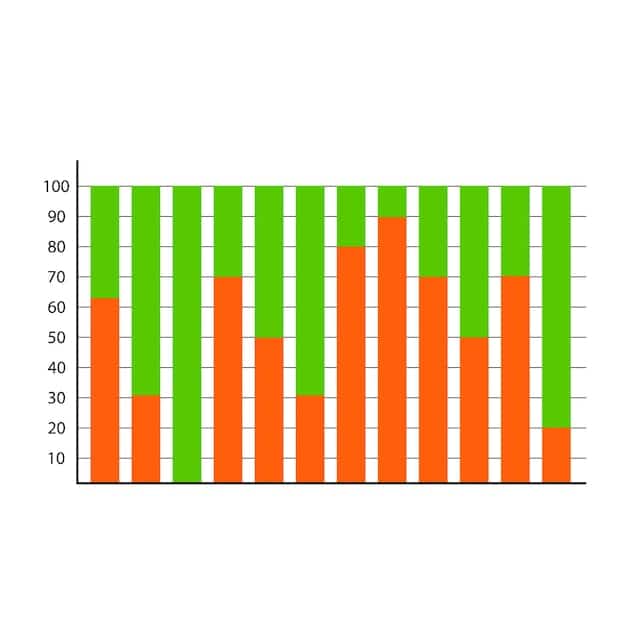Inflation’s Impact: How US Consumers Adapt Spending Habits

The impact of inflation on US consumers is reshaping spending habits as they prioritize necessities, seek deals, and re-evaluate financial priorities in response to rising prices.
The relentless rise of prices is forcing US consumers to rethink their spending strategies. The impact of inflation: How consumers are adapting their spending habits is a complex interplay of necessity, adaptation, and innovation.
Understanding the Inflationary Landscape in the US
Inflation, the silent thief of purchasing power, has become a prominent feature of the US economic landscape. Understanding its causes and effects is crucial for consumers aiming to navigate these challenging times.
What is Inflation and Why is it Happening?
Inflation refers to the sustained increase in the general price level of goods and services in an economy over a period of time. Several factors contribute to this phenomenon, including increased demand, supply chain disruptions, and government policies.
In the US, recent inflationary pressures have been attributed to a combination of factors, such as:
- Increased consumer demand following the COVID-19 pandemic.
- Supply chain bottlenecks impacting the availability of goods.
- Stimulus measures injecting additional money into the economy.
These factors, coupled with rising energy prices, have created a perfect storm for inflation, impacting various sectors of the economy and household budgets.
How Does Inflation Affect Consumers?
The most direct impact of inflation on consumers is the erosion of their purchasing power. As prices rise, each dollar buys fewer goods and services, affecting the overall standard of living. This can lead to difficult choices for households, forcing them to prioritize essential expenses over discretionary spending.
Furthermore, inflation can create uncertainty and anxiety among consumers. The fear of future price increases may lead to reduced spending and investment, contributing to economic slowdown.

In conclusion, understanding the dynamics of inflation is essential for consumers to make informed financial decisions and adapt their spending habits accordingly. By being aware of the underlying causes and potential impacts, individuals can take proactive steps to mitigate the negative consequences of rising prices.
Adjusting Grocery Shopping Habits
Grocery shopping, a routine task for most, has become a significant battleground in the fight against inflation. Consumers are increasingly adapting their strategies to stretch their grocery budgets.
Prioritizing Needs Over Wants
One of the most common adaptations is prioritizing essential food items over non-essential ones. This means cutting back on luxury foods, snacks, and processed items in favor of staples like grains, fruits, and vegetables.
Embracing Generic Brands
Generic or store-brand products offer a more affordable alternative to name-brand items. Many consumers are discovering that the quality difference is often negligible in exchange for significant cost savings.
Strategic Meal Planning
Planning meals in advance can significantly reduce food waste and impulse purchases. By creating a shopping list based on planned meals, consumers can avoid buying unnecessary items and stick to their budget.
These adaptations allow consumers to manage their grocery expenses more effectively during times of inflation:
- Comparing prices across different stores.
- Buying in bulk when appropriate.
- Utilizing coupons and discounts.
By implementing these strategies, households can maintain a balanced diet without breaking the bank.
Conclusively, consumers adapt to grocery shopping habit by prioritizing needs over wants. Strategic meal planning and embracing generic brands help consumers cope with this inflationary period.
Cutting Back on Discretionary Spending
Discretionary spending, the category of expenses that are non-essential, is often the first area where consumers make cuts when faced with rising inflation. Finding creative ways to reduce these expenses is vital for maintaining financial stability.
Entertainment and Leisure
Reducing spending on entertainment and leisure activities is a common strategy. This may involve opting for cheaper alternatives, such as streaming services over cinema visits, or engaging in free activities like hiking and picnicking.
Travel and Vacations
Travel plans are often scaled back or postponed altogether during inflationary periods. Consumers may choose to travel locally, opt for budget-friendly accommodations, or delay vacations until prices become more favorable.
Dining Out
Eating at restaurants and ordering takeout are typically more expensive than cooking at home. Many consumers are reducing the frequency of dining out and cooking more meals at home to save money.

Here are some strategies to reduce discretionary spending:
- Identify non-essential expenses.
- Set a budget for discretionary spending.
- Find free or low-cost alternatives for entertainment and leisure.
- Cook more meals at home.
Through mindful spending and creative alternatives, consumers can successfully cut back on discretionary expenses and free up their budgets for essential needs.
In summary, entertainment, travel, and recreation, and dining out are areas where one can drastically reduce discretionary spending. In turn, this may lead to financial stability during inflationary periods.
Seeking Value and Discounts
In an inflationary environment, finding value and seeking discounts become essential strategies for consumers. These approaches allow individuals to make their money go further and maintain their standard of living without overspending.
Utilizing Coupons and Promotions
Coupons, both physical and digital, offer immediate savings on a variety of products. Consumers are becoming more proactive in searching for and utilizing coupons to reduce their expenses.
Loyalty Programs and Rewards
Loyalty programs and rewards programs offered by retailers can provide discounts, points, or cashback on purchases. Enrolling in these programs and taking advantage of the benefits can lead to substantial savings over time.
Comparing Prices Across Retailers
Price comparison is a fundamental strategy for finding the best deals. Consumers are using online tools and apps to compare prices across different retailers before making a purchase.
Here are some additional tips for finding value and discounts:
- Follow retailers on social media for exclusive offers.
- Sign up for email newsletters to receive promotional updates.
- Use browser extensions that automatically find and apply coupons.
By actively seeking value and discounts, consumers can navigate the inflationary landscape more effectively and protect their purchasing power.
Overall, using coupons and retailer promotions are a great way to cut costs during inflation. In consequence, consumers can maintain their life style without overspending.
Re-evaluating Financial Priorities
Inflation often prompts consumers to re-evaluate their financial priorities and make necessary adjustments. This involves reassessing their budgets, saving habits, and investment strategies.
Budgeting and Financial Planning
Creating a detailed budget is essential for tracking income and expenses. By identifying areas where spending can be reduced, consumers can allocate more funds to essential needs and savings.
Saving and Investing
Inflation can erode the value of savings over time. Consumers are exploring different investment options to protect their wealth and generate returns that outpace inflation.
Debt Management
High levels of debt can become burdensome during inflationary periods. Consumers are prioritizing debt management by paying down high-interest debts and avoiding new borrowing.
Here are some steps for consumers to re-evaluate their saving and investment strategies:
- Consider inflation-protected securities.
- Diversify investments across different asset classes.
- Consult with a financial advisor for personalized guidance.
By proactively re-evaluating their financial priorities, consumers can navigate the inflationary landscape with greater resilience and confidence.
Finally, consumers who manage their debt, invest, and plan their spending habits have more saving during inflation. Therefore, re-evaluation of priorities is essential during inflation.
The Long-Term Impact on Consumer Behavior
The adaptations consumers make in response to inflation can have long-term effects on their spending habits and financial behaviors. These changes can shape the future of retail, investment, and overall economic trends.
Shift in Spending Preferences
Consumers may develop a greater preference for value-driven purchases, prioritizing quality and durability over brand names. This shift can lead to increased demand for generic products and discount retailers.
Increased Financial Awareness
The experience of navigating inflationary periods can lead to greater financial awareness and literacy. Consumers may become more proactive in managing their budgets, saving for the future, and making informed investment decisions.
Adaptation of Technology
Consumers are more likely to adopt technology as a way to save money. These technologies include price comparison apps and using discount codes while shopping online. With these, consumers are more equipped to adapt to trends in the economy.
Ultimately, adaptation of technology leads to:
- Changing retail trends.
- Changing investment goals.
- A more economical society.
In conclusion, consumer behavior not only adapts to present trends, but also has a lasting impact on the economy. In particular, adaptation of technology has a lasting role.
| Key Point | Brief Description |
|---|---|
| 🛒 Prioritizing Needs | Focus on essential items over discretionary ones in grocery shopping. |
| 💸 Cutting Discretionary Spending | Reduce expenses on entertainment, travel, and dining out. |
| 🏷️ Seeking Discounts | Using retailers promotions and coupons can greatly reduce costs. |
| 📊 Re-evaluating Finances | Adjusting budgets, saving habits, and investment strategies. |
Frequently Asked Questions (FAQ)
▼
Inflation increases the prices of everyday goods and services, reducing your purchasing power and potentially requiring adjustments to your budget to afford the same items.
▼
Prioritize needs over wants, embrace generic brands, plan your meals strategically, and compare prices at different stores to find the best deals.
▼
Cut back on entertainment, travel, and dining out. Look for free or low-cost alternatives and cook more meals at home to save money.
▼
Consider investing in inflation-protected securities, diversify your investments across different asset classes, and consult with a financial advisor for tailored advice.
▼
Consumers may shift towards value-driven purchases, develop greater financial awareness, and increasingly adopt technology to save money while maintaining their standard of living.
Conclusion
Adapting to the impact of inflation requires a multi-faceted approach, from adjusting daily spending habits to re-evaluating long-term financial goals. By embracing these strategies, US consumers can navigate the challenges of rising prices and maintain their financial well-being.





